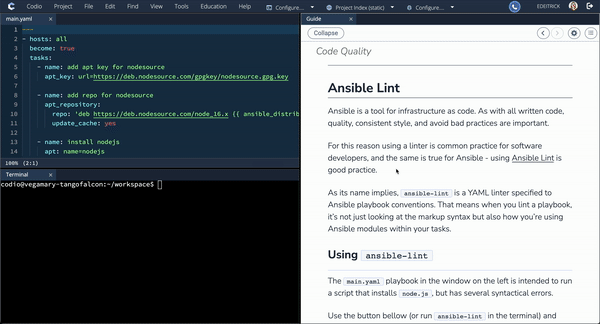This course requires the use of (VMs) Virtual Machines which are an additional cost. To enable this for your organization, send an email to help@codio.com with approximate details of the number of students who will require access to computed VMs.

Constructing Knowledge Through Coding
Introduction to Developer Operations emphasizes students applying and exploring the information presented. An editor, terminal, or Virtual Machine accompanies each page with new DevOps concepts. This allows students to see for themselves how the computer responds to configurations and commands. In addition, the content provides code snippets to get students started as well as suggested avenues for investigation.
Auto-Graded Assessments
Students receive immediate, rich feedback about their DevOps skills. In addition to correctness feedback (i.e. right or wrong), students will also see an explanation with the complete solution when learning DevOps.
There are a wide variety of questions, all of which are auto-graded, giving students a sense of their understanding of the DevOps course material right after they are introduced to it and as they attempt harder and harder problems.
Lowering the Barrier to Entry
The Introduction to DevOps course reflects the need for computing education to meet students where they are. Like any specialized community, computing has its own jargon. The formal teaching of computing should not burden students with the assumption that they are fluent in this special language.
The material is presented in smaller units that are more manageable for the students. The same vocabulary and DevOps concepts are covered, but in a more approachable way. Our DevOps course states information as plainly as possible, and, when appropriate, use images, tables, or lists.
Another way in which this content is more approachable is that it uses many small problems instead of one large project. Research shows that a variety of smaller problems increase student performance and reduce stress.
Using many small problems leads to students spending a sufficient amount of time on their work. This way, they do not wait until the last moment to begin their work. Using this approach makes this the best course on DevOps.
Encouraging Customization Through Modularity
This content is not a one-size-fits-all solution. Instead, it implements a modular format. Natural break points occur in the curriculum where instructors can make the changes they deem necessary. Instructors can re-name, re-order, or remove units.
Using Codio’s excellent content authoring tools, they can author new material. This modular approach gives instructors flexibility when designing the learner’s experience
What's Included?
- Interactive content with visuals and minimal text for maximum hands-on engagement
- Example code snippets that can be copied
- A fully-featured web-based IDE
- Run commands with the click of a button
- A sudo-privileged terminal
- Virtual Machines*
Virtual Machines are an extra cost. Virtual Machines are required for 2 of the modules (as indicated) in this course.